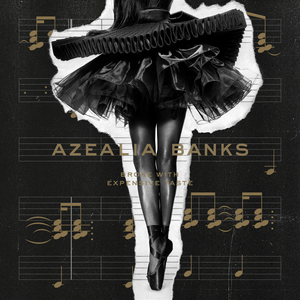Azealia Banks is 23.
It's important to remember that fact when you consider the tumultuous two year period leading up to the release of her schizoprenic and excellent debut album.
In those two years, she has amassed a mega-hit song, several acclaimed mixtapes, won and lost a major label deal and instigated many twitter beefs. She went from unbeatable to, in her own words, "untouchable".
Whilst the twitter beefs don't look like they'll abate any time soon, there is this album, and what a gorgeous mess it is.
In an age when average-joe consumer is likely to say that all music is mainstream, lets be clear.
This is not a mainstream album, but it is a great one.
I've been listening to the album in the background most nights, not really deeply listening, and it's almost as if that's the way it should be listened to.
One time I walked in to the lounge-room and Azealia was adopting a perfect Spanish flow like a true chica on the funkily salsified "Gimme A Chance", whilst another time I found her doing her best Annette Funicello impression on the 60's Beach Party banger "Nude Beach A Go-Go". It's not a concept you're brain easily grips on to.
It doesn't stop there. Having equal skill in both singing and rhyming allows Banks to be flexible, but it also means she's spoiled for stylistic choices. If I'm so good at all these styles, why not do them all?
There's a Garage/2-Step track "Desperado", sampled from the fantastic early aught's MJ Cole classic and there's of course her house-influenced 2012 world-beater "212".
You can see why Interscope was baffled with how to market her.
Regardless of whether she's mainstream or not, Banks is just being herself, a product of a broad cultural upbringing. She hails from Harlem, which up until the 90's was predominantly populated by african-americans. By the time she was a teen, she might not have even noticed that her neighbourhood had become more multicultural.
Banks would have grown up in a populus that was infused with the DNA of local Hip-Hop denizens like Tupac, Cam'ron, A$AP Rocky, Mase and P. Diddy. Added to that, she would also have felt the influence of incoming White, Hispanic and foreign-born African communities, who have increasingly made up Harlem's numbers as Manhattans property prices have risen sharply in price.
This diverse cultural background partly explains her list of collaborators, which is as varied as it it is long. Lone, Diplo, Baauer, Disclosure, MachineDrum and Hudson Mohawke are among the better-known producers who have worked with Bank$, none of whom are among the mainstream soundsmiths that we typically associate with chart-topping pop acts.
However, it's precisely this melange of differing collaborators that ensures that Expensive is as restlessly interesting and entertaining as it is.
"Chasing Time", produced by Philly producer Pop Wansel, is classic Banks. It's an uptempo dance track that allows her to flex her considerable house muscle, but also challenges her to keep pace with her rap verses. This she does with an ease that very few, if any, of her contemporaries could manage. How does this happen? How does Banks rip through a track that most pop stars wouldn't even consider? Wansel has an idea. "Most rappers are not in a space right now to be innovative or to be open to different shit. They want to chase what’s on the radio. They want a “club banger.”
Banks wants club bangers too, but she also wants 60's pop songs and Garage tunes.
This record is not for everybody, hell, I'm pretty sure it's not even meant to be for me. For the person that it is for, Banks herself, it's important.
It's shows an artist in motion, someone who has spent the last three years working out who she is, and someone who is still working that out.
As fascinated as I am following her journey, I kinda hope she never stops searching.




.jpg)




